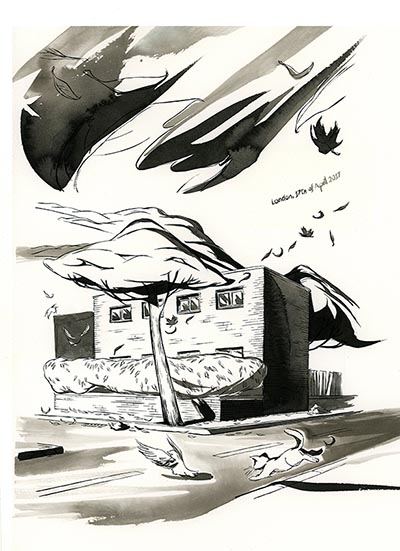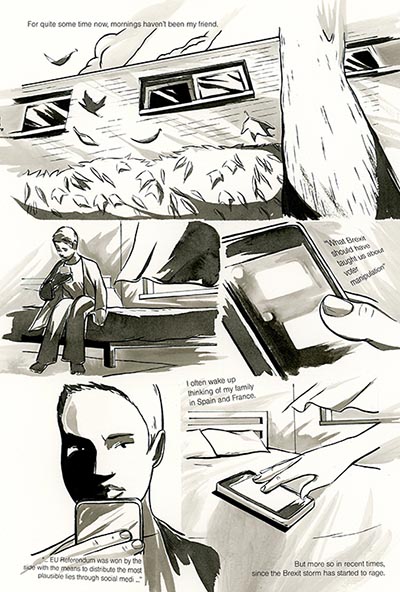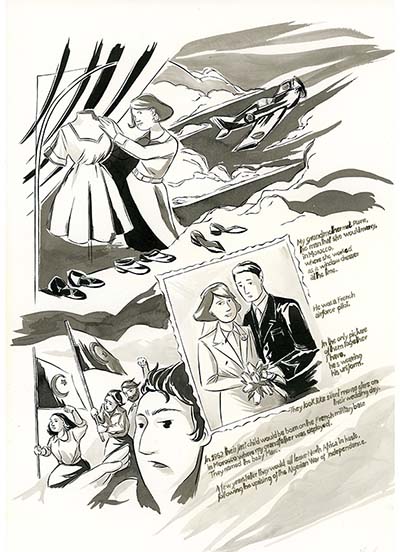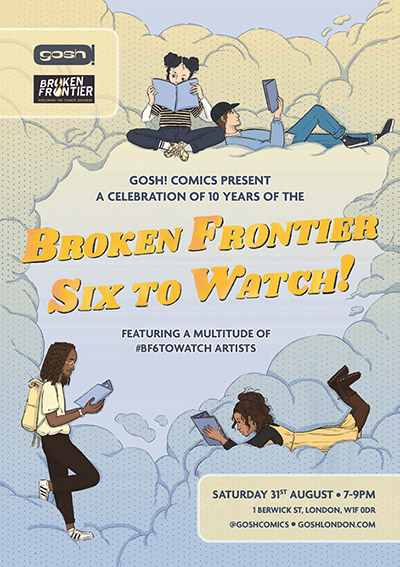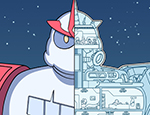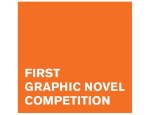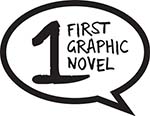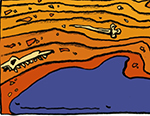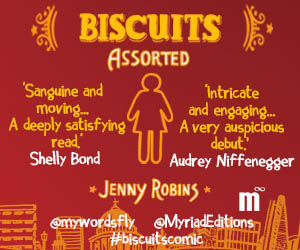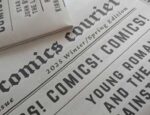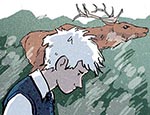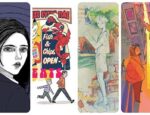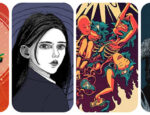10 YEARS OF THE BF SIX TO WATCH! In the third of our interviews with this year’s Broken frontier Six to Watch creators we chat with French-Spanish, UK-based artist Zoè Delautre Corral. While her comics back catalogue to date may not yet be an extensive one the first chapter of her self-published autobiographical comic April 17th – part of a work-in-progress graphic memoir – has already gained some notable acclaim. Last year she was longlisted for the prestigious First Graphic Novel Competition and earlier this year at BF I said of April 17th that “the promise inherent herein is undeniable.” April 17th’s wider storytelling remit is to “hold the hands of all the women” in the artist’s family whose stories have remained silent while at the same time exploring her own identity and how that has been shaped by the early suicide of her father. Today Delautre Corral talks to us about the responsibilities of autobio, supportive community networks in comics, and her love of ink and graphite…
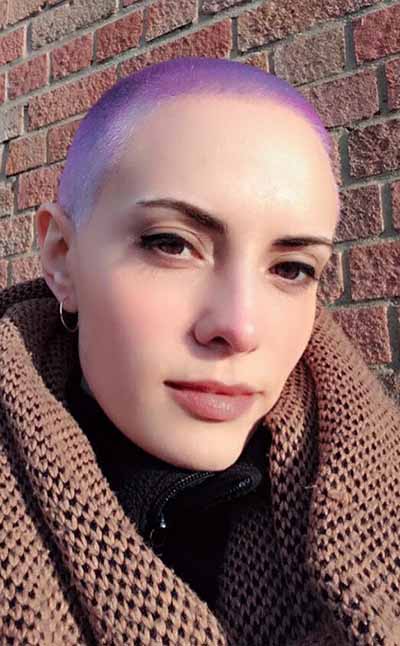
ANDY OLIVER: Introductory question first, Zoè. Can you tell us about your wider artistic practice and endeavours, and your background?
ZOÈ DELAUTRE CORRAL: I trained in Fine Art back in Spain, but drawing has always been my thing. When I finished uni back home I was quite desperate to live somewhere else, because opportunities for people with artistic inclinations were very thin in Spain at the time, they still are. So I left and came to London, with the plan of only staying for a few months, but I fell in love with the city, with its anonymity and its opportunities. I decided to do an MA in London at Kingston uni, which I loved, and that became quite the catalyst for me deciding to draw comics. I have always loved comics, but even though I love drawing I always saw the storytelling aspect of it as something that I wouldn’t be capable of grasping. But after I found a story that I really wanted to tell, it felt like something I could actually accomplish. And so I’ve been in love with it ever since.
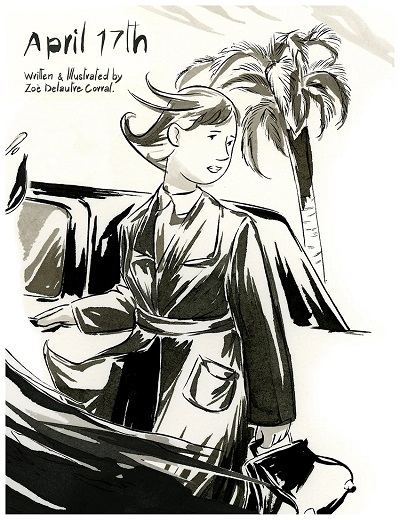
AO: What is it about comics as a form that appeals to you in your storytelling?
DELAUTRE CORRAL: I see comics making as such a layered fascinating medium, there’s so many elements to it. And there’s so much flexibility to it too, and opportunity to bend rules and make the medium your own. And of course it is the drawing that I love. Perversely I also love the fact that it’s usually, at least for me, such a long process. The scriptwriting, the storyboarding, the drawing, I just really love the craft. I think I particularly love that at least from my experience, it’s a very intimate process. It’s just you in your room doing the writing and the drawing, and you’re building something that will inspire people’s imaginations, and to me that’s beautiful.
AO: With that in mind, when did you first discover the medium?
DELAUTRE CORRAL: I started reading comics when I was very young maybe 6 or 7 years old, I remember it was the French comic Percevan. I remember being in love with the drawings and the darkness of the story. But the first comic I read I was truly fascinated by was Corto Maltese. My dad liked to sketch and I remember seeing some that he had copied from one of this comics series. I was intrigued so I researched and when I found it, I just really loved it.
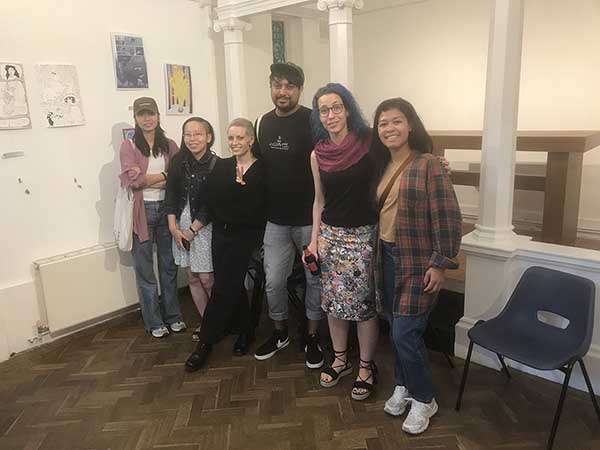
The recent Broken Frontier pop-up exhibition at the Chapel, St. Margaret’s House in Bethnal Green, London featured work from (left to right) Zhenyi Zheng, Dominique Duong, Zoè Delautre Corral, Shane Melisse, Alba Ceide and Manon Wright
AO: Earlier this year we reviewed a chapter from your intensely personal graphic memoir April 17th. What is the premise of the project and what are the themes you’re exploring in the book?
DELAUTRE CORRAL: This is an autobiographical story I started writing in 2020, but which developed from pages of diaries and letters from years before. The story tells of the events that began in April 17th of 2017, when I found out my paternal grandmother was dying in France. My relationship with my paternal family had been really fractured since my father’s suicide in 1991, and I have always carried a great deal of guilt because of that. From that day in April 2017, I felt a huge sense of urgency to amend and to build bridges, and also to get rid of the sense of shame. At the time also Brexit was unfolding, which as a foreigner of dual nationality that already felt a bit alien, felt like quite a jarring time. Eventually I came to the realisation that I just needed to tell this story, and get it out of me. And hoping someone else will find comfort in it too.
AO: Given the kind of story April 17th is how do you deal with the vulnerabilities of bringing such a personal account to the page?
DELAUTRE CORRAL: That’s a very good question. I think one of the biggest difficulties that I experienced when writing the script for this project, was that this story didn’t feel like it was only mine. I felt a lot of responsibility towards the people that took part in this story, and I had to consider to what extent I had a right to tell something that is as intimate to them as it is to me. But something that I feel liberated me and encouraged me to take the project forward was that I wanted to be free from guilt and shame. There’s a lot in this story to me about feeling guilty, and I got angry about carrying that feeling. I just told myself, if through freeing myself from this sadness I can alleviate someone else’s then it’ll be worth it. And everyone else that might be upset with me will hopefully forgive me eventually.
AO: What, for you then, are the particular responsibilities that go with autobiographical work?
DELAUTRE CORRAL: That’s definitely a difficult but a good question for me. Autobiographical works are profoundly personal, and I do believe we have a right to tell our story as we experienced it, and I think we all have a need to be heard and seen. But speaking from my own experience, particularly when writing and developing the project of April 17th, I had to consider not only other people’s experiences, but also their pain. That was very difficult, because I often came to the question of: should I tell this? Do I have a right to tell this? In the end I’m not sure there’s a right answer for every story. But I believe in telling stories with compassion, and when possible without judgement, for ourselves and for others.
AO: April 17th was longlisted for the First Graphic Novel Competition. How much of a booster was that?
DELAUTRE CORRAL: This was genuinely life changing for me, and I will forever be grateful for the opportunity that was given to me. I think us artists, we all struggle with some degree of impostor syndrome, so this opportunity was incredibly encouraging. Especially as a foreigner, it was easier for me to feel like a bit of an outsider. This opportunity helped me feel like I belong to something bigger than myself. It made me feel seen, and like perhaps what I had to tell could be of value to someone out there, and that made everything worthwhile.
AO: Your art on the project has a very haunting, moody and sometimes dreamlike style to it. Why did you choose that visual approach to bring the story to life?
DELAUTRE CORRAL: I am very fond of black ink and graphite, they’re definitely the media I feel the most comfortable with. I love the mercurial quality of ink washes, and how they sometimes seem to do their own thing. I do feel like I’m in a bit of a trance when I’m painting, I’m sure the other artists feel similarly.
I also love the quickness of the process. I’m quite impatient when I’m painting, I like to paint quickly and expressively. Also when drawing comics, I try to paint from memories or emotions in my mind rather than using image references, maybe that’s why the pages turned out a bit dreamy looking. I guess also, I do remember that time in my life as a bit of a strange dream that didn’t feel quite real.
AO: Can you give us some insights into your creative process and the mediums you work with?
DELAUTRE CORRAL: I think I’m definitely an analogue artist, mostly because I have no talent at all for digital art.
I’m just in love with graphite and ink, and the process of seeing the images appear on the paper in silence. This might sound a bit strange, but I think I’m most in the place for drawing and painting when I’m a little sad and inwards. I think maybe because that’s the time when I’m feeling most vulnerable and open.
I like silence and solitude when painting. For me making art is a solitary process, I see it as a secret that you’re bringing to the world. That’s why I feel really shy about people looking at me when I paint. I’m very sensitive to judgement unfortunately. That’s been a tough one for me especially in the time of social media. I often have to restrain myself with what I share online, to protect my own process. I try to remind myself, this is something that I need to do for myself alone, everything else is second.
AO: As a newer voice in UK comics how important has it been to interact with the wider comics community to build your profile?
DELAUTRE CORRAL: This has genuinely been so exciting and such a joy for me. I think we artists do our work because we just need to do it. But to be seen and to belong to a community that sees you, brings a new layer of meaning to what you do. I do think that art elevates life, and I think all art has an audience that will see value in it. To find a community encouraged me to just keep on making the thing, the thing will find and audience eventually.
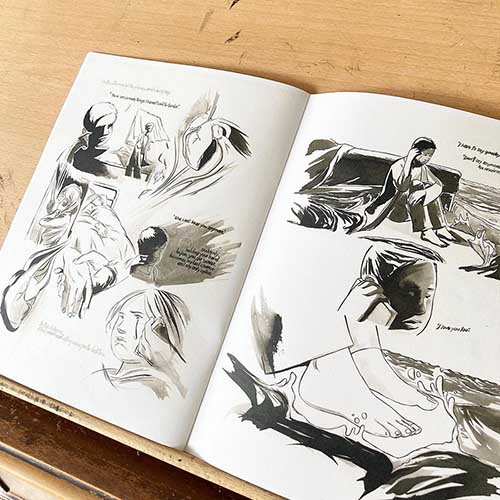
AO: What have been your impressions of the indie scene here so far?
DELAUTRE CORRAL: I honestly have felt so so welcomed and have been so excited to meet everyone so far. I think I’ve been really lucky that everyone I have met so far has been so kind and lovely.
Something I have found just amazing is the wealth of opportunities, competitions and support for illustrators and comics artists in the U.K. Unfortunately where I come from that’s not quite the case. For independent artists this is a lifeline. To have a hand lent to you and to see people put faith in your work, can mean absolutely everything, especially when at time the process can seem self-indulgent and pointless. I’m just so grateful.
AO: And finally, what other projects either in comics or other artistic mediums are you currently working on? What can we expect next from you?
DELAUTRE CORRAL: I think I can’t help myself to be drawn towards the themes of mortality and grief. I’m coming to terms with it! I also can’t escape ink. For some time I worked on different printmaking media, like screen print and woodcarving, but right now I’m fully in the ink. I’m currently working on chapter two of April 17th, but I’m also painting some standalone works. You can expect more of death, but also of hope.
Visit Zoè Delautre Corral’s online store here
Interview by Andy Oliver
Zoè Delautre Corral will be a guest artist at the ’10 Years of the Broken Frontier Six to Watch’ Party at Gosh! Comics this coming Saturday, August 31st. Full details here.
2024 marks the tenth year of Broken Frontier’s ‘Six to Watch‘ initiative. Look for articles throughout the year celebrating the work of those artists who have been a part of the programme.





